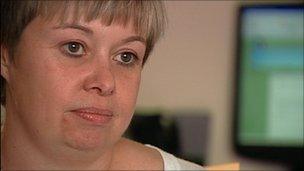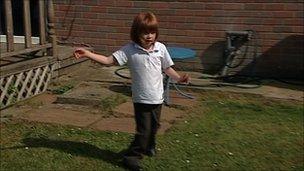Cerebral palsy families call for better NHS treatment
- Published

Kim Wakefield is campaigning for a new procedure to be made more available in the UK
A group of parents of children with cerebral palsy has started a campaign for better support from the NHS.
Their children have gone to the US for micro-neurosurgery, called selective dorsal rhizotomy (SDR), to help them walk.
The group, Support4SDR, said it now wanted the procedure available in the UK to all who need it.
The Department of Health said doctors could consider offering the treatment as long as results were monitored.
Dorset mother Kim Wakefield, chair of the group, said more help was also needed with physiotherapy.
Frenchay Hospital in Bristol has recently pioneered the same form of SDR, an operation which involves identifying, dividing and cutting spinal nerves which have been causing stiffness and pain in the legs.
Awaiting operations
Members of Support4SDR are setting up a charity, have started an online petition and are contacting MPs.
Mrs Wakefield, of Corfe Mullen, said their main goal was to make the new, less invasive form of SDR more accessible in the UK.
She said parents had been "left in the dark" by the medical profession about the availability in the US of the refined method of SDR as a treatment option.
Her five-year-old daughter Charlotte is among 77 children from the UK who have undergone the procedure refined by surgeon Dr T S Park at the St Louis Hospital in Missouri.
Another 20 are booked in there between now and the end of August and more are awaiting dates for operations.
Each has been helped by family, friends and their local communities to raise the £40,000 needed for the operation, aftercare, travel and accommodation expenses.
At Frenchay Hospital the operations are being funded by individual NHS primary care trusts on a case-by-case basis.
Three SDR procedures have been performed so far by consultant neurosurgeon Kristian Aquilina.
'Treatment risks'
Mrs Wakefield said the group was delighted with this development and would be offering support and information to families whether they were having SDR in the UK or in the US.
She said it was "vital" that the NHS put more resources to help all the families with the intensive physiotherapy which was essential after the operation to ensure its success.
She said: "The differences I have seen in Charlotte and the other children who have had SDR with Dr Park have been outstanding.
"It is not just about the walking - it's not a miracle cure - but it is about movement, about taking spasticity away, about taking away pain.

Charlotte Wakefield travelled to the US for micro-neurosurgery
"The difference in the confidence of all the children is amazing. They are all so much more comfortable and happier in their lives."
A Department of Health spokesperson said guidance by health watchdog NICE - the National Institute for Health and Clinical Excellence - for use of the treatment was revised in December in light of new evidence.
"It is right that NHS bodies are free to make decisions based on this evidence, and on the individual health needs of local people," she added.
"NICE has advised that selective dorsal rhizotomy can improve spasticity in the longer term and doctors can consider offering the treatment as long as its results are monitored.
"As the side effects and risks of the treatment can be serious, NICE expects doctors to carefully explain these to the patients and their families or carers beforehand."
A BBC Inside Out documentary about SDR will be shown on BBC One in the West and South West at 1930 BST on Monday 20 June, and on BBC iPlayer.
- Published26 May 2011